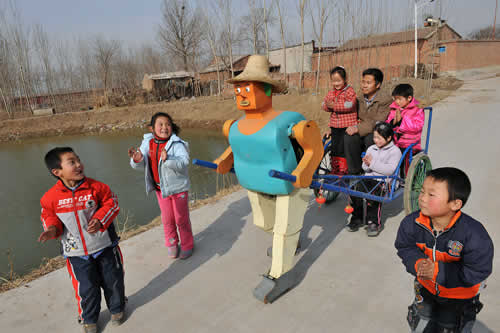'Peasant Da Vincis'
Wu didn't finish his primary education, instead he went back to the fields. But he never abandoned his interest in building robots. No one in the village understood him or his intentions, not even his own family.
In 1987, when he was 25 years old, Wu successfully built his first robot and named it Wu No. 1; it was soon followed by Wu No. 2 and Wu No. 3. By now, Wu has built more than 50 robots, each with different functions: Some can climb walls, and some can pull carriages. Others can sing, dance and draw pictures.
 |
|
This robot made by a Beijing peasant Wu Yulu can pull a carriage. |
Wu's robots have given him a certain amount of celebrity; he is known by some as the "robot father." He has even been invited to universities to give lectures on his creations. Some people, however, don't see his inventions as being very practical or useful.
"Although these inventions don't seem practical to most people, they reflect the peasants' passion for changing life by putting their ideas into practice," says Cai.
Cai explained that the reason for naming the exhibition "Peasant Da Vincis" has more to do with the spirit behind the inventions. Despite the fact that most of Da Vinci's inventions were failures and were poorly regarded in their time, he still persevered and created some lasting innovations.
"We are all full of curiosity about the world and have the passion to try things that we are interested in. This is quite a precious virtue in these modern times," he says.
 0
0 






